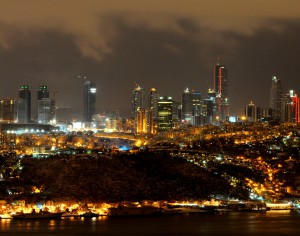31st January 2015
Turkey 2023: why the UK welcomes Turkish success

Let’s imagine a Turkey almost 10 years from now, in 2023.
The years since 2015 have been tough for the Turkish economy, as for all countries. But the people of Turkey have risen magnificently to the challenge. By 2023, buoyed by high rates of economic growth for each of the last eight years, nominal GDP has more than doubled. Turkey has powered up the league table of world economic giants.
Turkey’s population has continued to grow, stabilising as living standards have risen to reach 95 million people.
On the back of burgeoning economic growth, the Turkey of 2023 has strengthened its armed forces and is supporting UN-led peace keeping operations in 15 countries around the world, earning respect for the quality, discipline and equipment of its forces. Economic growth and a wise foreign policy have enabled Turkey to further boost its aid budget, contributing substantively to poverty alleviation and stability building in some of the world’s most needy countries.
The strength and stability of Turkey and its respected position in international affairs have helped Turkey to contribute to dispute resolution in a number of countries. As a powerful, populous Muslim democracy, Turkey has been influential in helping resolve disputes in the Middle East, helping that region to attain new levels of stability. Turkey’s own stability and strength enable it to play an increasingly influential role in building prosperity in neighbouring states, diminishing the appeal and influence of terrorism and reducing migration flows.
Big Turkish companies are increasingly internationalised, setting up R&D and manufacturing companies in several continents, acquiring well-known international brands and developing their own brands into worldwide household names. Turkish exports have diversified to include everything from hazelnuts to high-end manufactured products and financial and intellectual services.
The large, increasingly sophisticated and wealthy Turkish population of 2023 has become one of the world’s most exciting consumer markets. Spending by Turkish tourists is leading to a boom in heritage tourism across Europe. European and Turkish students are flocking to each other’s universities.
How, in this hypothetical 2023, are the security and prosperity interests of the United Kingdom affected by this surge in Turkey’s success and influence?
To assess this question it’s worth looking at British objectives for Turkey – what the Turkey network, including the Embassy in Ankara and the Consulate-General here in Istanbul, is trying to achieve right now, in 2015.
What are those objectives?
They’re pretty obvious. They include “Turkey playing an increasingly constructive role in promoting peace and security in its region and beyond”. They include “increasing bilateral trade between the UK and Turkey”. “Improved cooperation with Turkey on counter-terrorism and in fighting crime”. “Economic reform in Turkey boosting Turkey’s case as a potential EU member state”. And so on.
Why does this matter?
The point is that every single objective which the UK has with respect to Turkey is served by Turkey becoming stronger and more successful.
If Turkey becomes richer, it can invest more in the UK and can buy more British goods. If Turkey has stronger armed forces, it can play a more important role in stabilising the region. If Turkey pursues an active development policy around the region or around the world, that will help more countries to become wealthy and democratic; provide more sources of investment income; and reduce local and global instability – Somalia is a terrific example. The more countries which are rich enough to trade with each other, the wealthier and more stable the entire system becomes.
It’s a no-brainer.
Imagine the alternative. If, heaven forbid, 2023 Turkey had somehow become poor and unstable and plagued by crises, how would that help the United Kingdom? Of course that would be a disaster for British security and prosperity interests. It would create myriad new problems and threats for the UK. No-one wants that.
Why am I writing this blog?
The reason is that, all too often in commentary in Turkey, I hear re-cycled 100-year-old conspiracy theories that the United Kingdom somehow does not want Turkey to get stronger. Or even, weirdest of all, that somehow by invisible means of which evidence mysteriously can never be found, we have a secret agenda to “weaken” Turkey.
On this twisted logic, all of the UK’s efforts to increase trade and investment between our countries, of which there is plenty of evidence, are a fiendish cover plot; and my job, on which I have spent my entire working life for the past two and a half years, a cruel joke against me.
If there is such a hidden agenda, no-one has told me.
I should declare a personal interest. I love Turkey – see, for example, the 299 (so far) #reasonstolikeIstanbul on my twitter account @leighturnerfco. My existence for the last couple of years has been devoted to trying to boost trade between our two countries.
It is so blindingly obvious that it is in the interests of the UK for Turkey to be successful that my mind is boggled when I hear people postulating that the UK somehow has a secret plan to achieve the opposite.
So let’s ditch the conspiracy theories. And let’s get on with making our two countries as successful as we possibly can. That’s what serves our interests best. That’s what we’re here for.
*This article was first published on hurriyet.com.tr